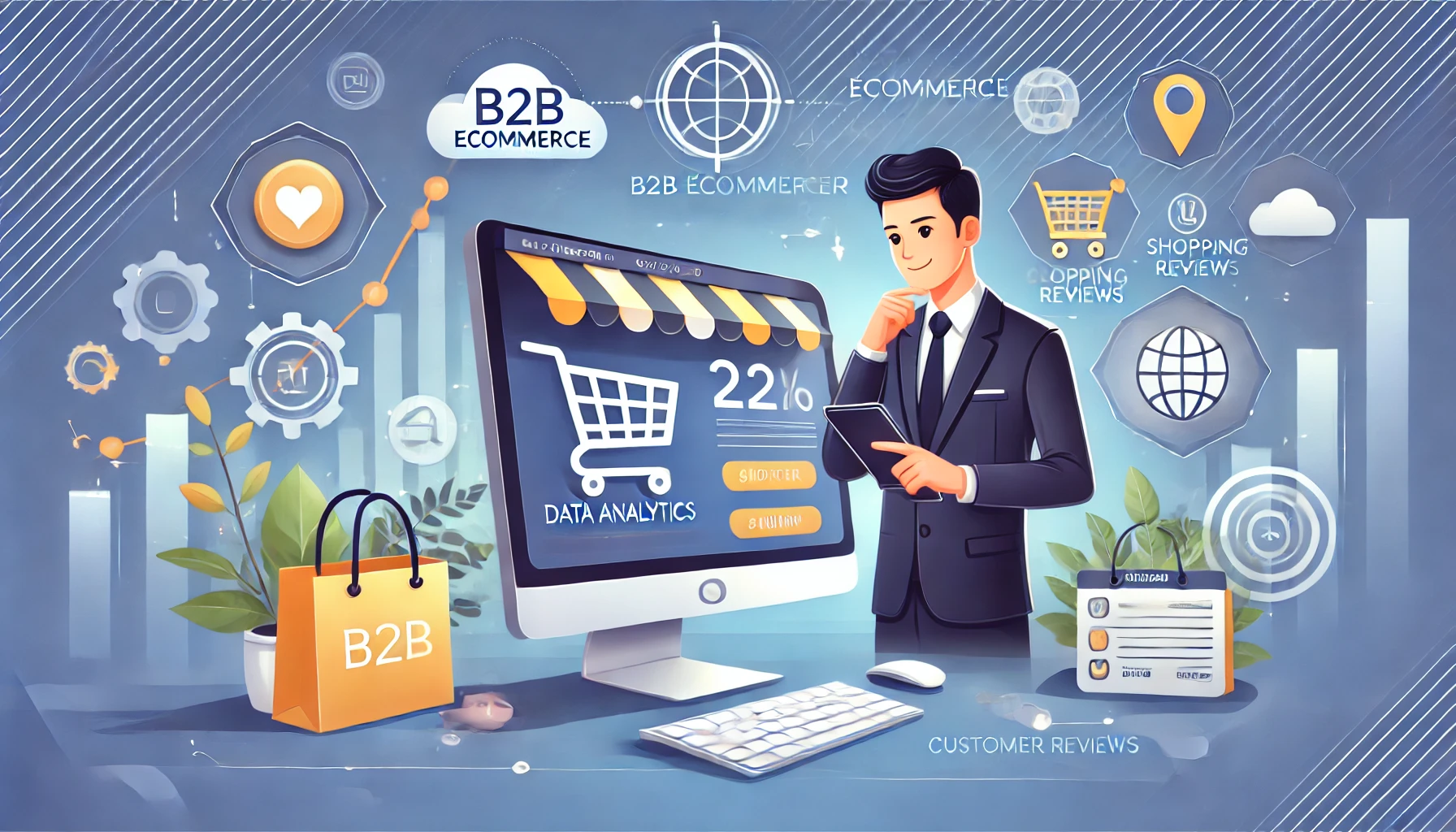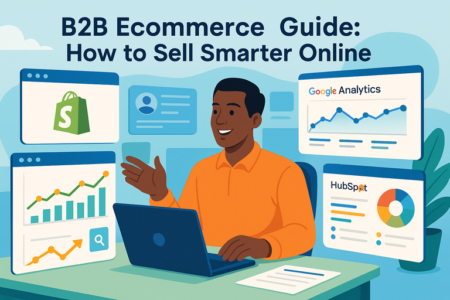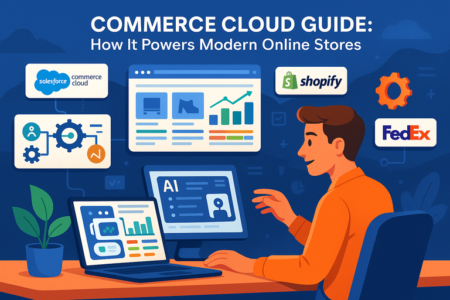Table of Contents
How does a skilled B2B eCommerce developer transform your business operations? What key strategies do they use to optimize platforms and drive revenue growth? These are just some of the questions this article will explore. A talented B2B eCommerce developer doesn’t just build websites—they create tailored solutions that simplify complex purchasing processes, enhance user experiences, and fuel long-term business success.
In this guide, we’ll dive deep into the value a skilled developer can bring to your B2B eCommerce platform, the strategies they employ, and how to choose the right expert for your needs. Let’s get started!
Understanding the Role of a B2B eCommerce Developer
A skilled B2B eCommerce developer is essential to building platforms that streamline business operations and create seamless user experiences. Let’s explore their core responsibilities, the skills they bring to the table, and how they add value to your business.
What Does a B2B eCommerce Developer Do?
A B2B eCommerce developer specializes in creating and maintaining digital platforms that cater to the needs of businesses transacting with other businesses. These developers focus on designing, coding, and optimizing platforms that handle complex purchasing processes, bulk transactions, and customized workflows.
They work closely with stakeholders to understand the specific needs of the business. For instance, they might develop custom integrations with ERP systems or build features like tiered pricing and account-based dashboards. This ensures that the platform aligns with the company’s operational goals and provides a seamless experience for clients.
Developers also ensure that the platform is scalable, secure, and equipped to handle the high-volume demands typical of B2B transactions. Their expertise allows businesses to deliver reliable and efficient services to their customers.
Key Skills Every B2B eCommerce Developer Should Have
The effectiveness of a B2B eCommerce developer often hinges on their technical and interpersonal skills. Understanding what sets a skilled developer apart can help businesses make informed hiring decisions.
Proficiency in programming languages like Java, PHP, and Python is fundamental. These languages enable developers to build dynamic and scalable eCommerce solutions. Additionally, they should have experience with platforms like Magento, Shopify Plus, or custom-built systems tailored for B2B needs.
Strong problem-solving skills are another critical asset. Developers often face challenges like integrating multiple third-party tools, ensuring data synchronization, or optimizing site performance. The ability to troubleshoot effectively saves time and prevents disruptions.
Soft skills, such as communication and project management, also play a role. Developers need to liaise with business teams and stakeholders to understand requirements and translate them into actionable solutions. A combination of technical expertise and collaborative skills ensures the success of the project.
How a Developer Enhances B2B Platforms
A skilled B2B eCommerce developer doesn’t just build platforms; they optimize them to meet the unique challenges of business-to-business transactions. This involves enhancing functionality, improving user experience, and ensuring long-term scalability.
Developers focus on creating user-friendly interfaces that simplify complex purchasing processes. For example, they might implement streamlined ordering systems that allow bulk purchases in a few clicks. This saves time for clients and improves their overall experience.
Security is another area where developers make a significant impact. By implementing robust encryption protocols and adhering to compliance standards, they protect sensitive business data. This fosters trust and builds stronger client relationships.
Finally, developers ensure that platforms are future-proof by integrating advanced features like AI-driven analytics, personalized dashboards, and mobile optimization. These enhancements not only improve current operations but also position the business for growth in an evolving market.
Investing in a skilled B2B eCommerce developer can transform your platform into a competitive asset, driving efficiency, security, and customer satisfaction.
Key Benefits of Hiring a Skilled B2B eCommerce Developer

Partnering with a skilled B2B eCommerce developer ensures your platform meets the specific demands of business clients while fostering growth and operational efficiency. Let’s break down the core benefits they bring to your business.
Streamlining Complex Purchasing Processes
Simplifying intricate purchasing workflows is one of the primary contributions of a B2B eCommerce developer. They craft systems that handle bulk orders, multiple payment options, and unique client requirements effortlessly.
A skilled developer ensures your platform accommodates features like tiered pricing and bulk order discounts. These features save clients time and provide them with tailored options that match their purchasing needs. For example, implementing dynamic pricing can automate discounts for high-volume purchases, making transactions seamless and attractive.
Integration with ERP and CRM systems is another area where developers shine. Connecting your platform to these tools centralizes data management, improves inventory tracking, and ensures synchronized operations. This minimizes manual tasks and reduces the risk of errors in order processing.
An intuitive dashboard can transform how clients manage their accounts. Developers design interfaces that simplify reordering, tracking shipments, and managing invoices, empowering clients with self-service tools that enhance their experience.
Moreover, skilled developers build platforms with scalability in mind. As your business grows and order volumes increase, these systems can handle the demand without compromising performance or functionality.
Enhancing User Experience for B2B Clients
A B2B eCommerce developer’s expertise extends to creating platforms that prioritize user satisfaction. They focus on delivering a smooth and enjoyable experience for clients, ensuring every interaction is intuitive and efficient.
Personalization is a significant element of modern eCommerce. Developers use data-driven insights to offer personalized product recommendations, tailored promotions, and account-specific catalogs. This not only improves user satisfaction but also boosts conversion rates by addressing specific client needs.
Site speed and performance are critical for user retention. A skilled developer optimizes loading times and ensures your platform performs well under heavy traffic, reducing frustration for clients navigating the site.
Mobile responsiveness is another area of focus. Developers ensure your platform functions seamlessly on any device, providing convenience for clients who access it on the go. This expands your reach and improves client accessibility.
Developers also incorporate robust search and navigation features. Designing intuitive search filters and category structures makes it easier for clients to find what they need quickly, enhancing the overall user experience.
Boosting Platform Security and Scalability
Security and scalability are foundational to a successful B2B eCommerce platform. A skilled developer ensures your platform meets the highest standards in both areas, providing peace of mind for you and your clients.
To protect sensitive business data, developers implement advanced encryption methods, secure payment gateways, and multi-factor authentication. These measures reduce the risk of cyberattacks and instill trust in your platform.
Compliance with industry standards is another critical aspect. Developers ensure your platform adheres to relevant regulations, such as GDPR or PCI DSS, safeguarding both your business and client data from legal risks.
Scalability is equally important. A skilled developer designs platforms that can handle growth seamlessly, whether it involves increased transaction volumes, expanded product catalogs, or new client accounts. This ensures your platform remains reliable even as your business scales.
Disaster recovery systems and regular backups are often part of the package. Developers put safeguards in place to ensure minimal downtime and quick recovery in case of technical issues, protecting your operations from disruptions.
With the right B2B eCommerce developer, your platform becomes a secure and scalable asset that supports long-term growth and builds trust with your clients.
Effective Strategies a B2B eCommerce Developer Implements
A skilled B2B eCommerce developer employs tailored strategies to optimize your platform, ensuring it meets the unique demands of business clients. Let’s explore some of the most impactful approaches they take.
Optimizing Platforms for Bulk Transactions
Managing bulk transactions efficiently is crucial for B2B eCommerce platforms. Developers focus on creating systems that handle large orders without compromising performance or accuracy.
One key strategy is implementing tiered pricing models. These models allow businesses to set dynamic prices based on order quantities, encouraging bulk purchases while providing flexibility for clients. For instance, a client ordering 1,000 units might receive a discount unavailable for smaller orders, streamlining the decision-making process.
Developers also design platforms that simplify the bulk ordering process. Features like bulk upload tools or pre-saved order templates enable clients to place large orders with minimal effort. These tools save time and reduce the chances of errors, ensuring a smoother experience for users.
Automation plays a significant role in handling bulk transactions. Skilled developers integrate automation tools that manage inventory updates, generate invoices, and track order progress in real time. This not only improves efficiency but also minimizes manual intervention.
Lastly, robust reporting systems are essential. Developers build tools that provide detailed insights into order patterns and inventory levels, allowing businesses to anticipate demand and optimize stock management.
Leveraging Custom Integrations for Business Growth
Custom integrations are a powerful way to enhance platform functionality and drive business growth. B2B eCommerce developers excel in creating seamless connections between various tools and systems.
One example of this is integrating CRM and ERP systems. These integrations allow businesses to manage customer data, track sales, and monitor supply chains more effectively. For instance, syncing your platform with an ERP ensures accurate inventory updates, reducing the risk of overselling.
Another impactful integration involves payment gateways. Developers choose secure and scalable payment solutions that support multiple currencies and payment methods, catering to diverse client needs and expanding market reach.
Marketing automation tools are another area where developers make a difference. They incorporate tools that enable personalized email campaigns, targeted promotions, and automated follow-ups, enhancing client engagement and driving repeat business.
Developers also prioritize API integrations that allow platforms to connect with third-party apps or services. This flexibility ensures your business can adapt to changing needs and incorporate new functionalities as they arise.
Ensuring Mobile-Friendly B2B eCommerce Design
With more businesses relying on mobile devices for their operations, a mobile-friendly design is essential for any B2B eCommerce platform. Developers focus on creating responsive and intuitive designs that work seamlessly across all devices.
Responsive design ensures your platform automatically adjusts to various screen sizes, providing a consistent experience whether clients access it on a smartphone, tablet, or desktop. This is crucial for retaining users and reducing bounce rates.
Navigation is another area of focus. Developers design clean and straightforward menus that make it easy for clients to find products, access account details, and complete transactions on smaller screens.
Mobile optimization also includes improving loading speeds. Developers implement strategies like image compression and efficient coding practices to ensure your platform loads quickly on mobile devices, enhancing user satisfaction.
Moreover, mobile-friendly designs often incorporate touch-friendly elements. Features like large buttons, swipe gestures, and simplified forms improve usability and cater to clients who prefer mobile interactions.
Investing in mobile optimization not only improves user experience but also positions your business as forward-thinking and client-centric, setting you apart in a competitive market.
How a Developer Drives Revenue Growth for B2B Businesses

A skilled B2B eCommerce developer plays a pivotal role in driving revenue growth through strategic enhancements that optimize performance, user engagement, and operational efficiency. Let’s explore how their expertise translates into tangible financial gains for businesses.
Improving Sales through Personalization and Automation
Personalization and automation are transformative strategies for boosting B2B sales. Developers create platforms that cater to individual client needs, offering a tailored experience that encourages repeat purchases and fosters loyalty.
Personalization begins with data. Developers integrate tools that analyze client behavior, preferences, and purchase history to deliver targeted recommendations. For instance, showing a client products related to their previous orders or offering customized bundles enhances the shopping experience and increases sales potential.
Automation takes the efficiency a step further. Developers incorporate automated workflows that handle tasks like sending re-engagement emails, generating invoices, and updating inventory. This streamlines operations, allowing businesses to focus on building relationships rather than manual processes.
Dynamic pricing is another game-changer. Developers implement systems that adjust pricing based on factors like order volume or client-specific agreements. This flexibility attracts larger orders and builds trust with clients, who feel their unique needs are being addressed.
Moreover, interactive dashboards empower clients to manage their accounts easily. Developers design features that allow for quick reordering, reviewing past transactions, or tracking shipments. This reduces friction in the sales process and keeps clients engaged.
Reducing Downtime with Efficient Maintenance
Downtime can be a revenue killer for B2B platforms. A skilled developer ensures systems run smoothly, minimizing disruptions that can lead to lost sales or dissatisfied clients.
Proactive maintenance is a core focus. Developers schedule regular performance checks, software updates, and security audits to prevent issues before they arise. This keeps the platform reliable and ready to handle high volumes of transactions.
Developers also invest in monitoring tools that provide real-time alerts for potential problems. These tools allow for quick identification and resolution of issues, ensuring minimal impact on operations and client satisfaction.
Redundancy systems are another safeguard. A skilled developer sets up backup servers and recovery protocols that ensure the platform remains accessible even during unexpected outages. This level of preparedness demonstrates a commitment to reliability and builds trust with clients.
Scalability is equally important. Developers design platforms that can adapt to increasing demands, such as peak shopping seasons or business expansion. This prevents performance bottlenecks and ensures clients have a seamless experience.
Enhancing Lead Conversion through Advanced Analytics
Advanced analytics provide the insights necessary to refine strategies and improve lead conversion rates. Developers integrate analytics tools that offer a comprehensive view of client behavior and platform performance.
Data visualization is key. Developers build dashboards that present complex data in an easy-to-understand format. This allows businesses to track metrics like conversion rates, average order value, and client retention at a glance.
Predictive analytics is another powerful tool. Developers incorporate algorithms that forecast trends, helping businesses anticipate client needs and adjust strategies accordingly. For example, identifying when a client is likely to reorder enables proactive outreach, increasing the likelihood of a sale.
Heatmaps and click-tracking tools provide valuable insights into user behavior. Developers use these tools to identify areas of the platform that perform well and those that need improvement. Addressing pain points can significantly boost conversion rates.
A/B testing capabilities are also integrated into the platform. This allows businesses to experiment with different layouts, calls-to-action, or product displays to determine what resonates most with their audience, driving more conversions.
Investing in these strategies ensures a B2B eCommerce platform remains competitive, adaptable, and profitable, delivering sustained revenue growth.
Choosing the Right B2B eCommerce Developer
Finding the perfect B2B eCommerce developer is a critical step in building a platform that meets your business needs and drives growth. This section will guide you through evaluating candidates and making an informed decision.
Evaluating Experience and Portfolio
Assessing a developer’s experience and portfolio is essential to ensure they have the skills needed to deliver a successful platform. Start by reviewing their past projects to understand their expertise and style.
A strong portfolio will showcase projects similar to your requirements. Look for examples of B2B platforms they have developed, particularly those with features like bulk order processing, integration with ERP systems, or custom dashboards. These examples indicate they understand the unique challenges of B2B eCommerce.
Ask for details about their role in each project. Did they handle end-to-end development, or were they part of a larger team? Knowing their level of involvement can give you insights into their capabilities and how well they’ll fit with your project.
References can provide valuable feedback. Reach out to their previous clients to learn about their work ethic, problem-solving abilities, and how they handle challenges. Positive testimonials can reinforce your confidence in their skills.
It’s also helpful to consider how long they’ve been working in the B2B eCommerce space. A developer with years of experience is likely to anticipate potential hurdles and deliver efficient solutions.
Assessing Technical Expertise and Industry Knowledge
A skilled B2B eCommerce developer must have a solid technical foundation and a deep understanding of industry trends. This combination ensures they can create a platform that’s both functional and future-ready.
Technical expertise includes proficiency in programming languages like PHP, JavaScript, and Python, along with experience in platforms such as Magento or Shopify Plus. Ask potential developers about their familiarity with these technologies and how they apply them to build scalable solutions.
Understanding the nuances of B2B eCommerce is equally important. For example, a developer who knows the importance of features like tiered pricing or account-specific catalogs can deliver a platform tailored to your audience. Their knowledge of industry standards, such as GDPR or PCI compliance, ensures your platform adheres to necessary regulations.
Inquire about their problem-solving approach. How do they tackle challenges like integrating multiple systems or optimizing site performance? Their ability to think critically and offer innovative solutions can set them apart from others.
A strong developer will also stay updated with emerging technologies. Ask about their experience with tools like AI-driven analytics or APIs that enhance platform functionality. Their willingness to innovate can be a significant asset to your project.
Questions to Ask Before Hiring a Developer
The interview process is your opportunity to dive deeper into a developer’s skills, experience, and work style. Prepare a list of questions that cover technical and non-technical aspects to ensure they’re the right fit.
Start with questions about their process. For instance, “How do you approach understanding a client’s needs?” or “What is your strategy for managing project timelines and budgets?” Their responses will reveal their organizational skills and commitment to delivering results.
Explore their problem-solving mindset. Ask about challenges they’ve faced in previous projects and how they resolved them. This can highlight their ability to adapt and overcome hurdles.
It’s also important to discuss communication. Questions like “How often will we receive updates?” or “What tools do you use for collaboration?” can help you gauge how well they’ll work with your team.
Lastly, ask about their availability and post-launch support. Will they provide maintenance or troubleshoot issues after the platform goes live? Their willingness to support you beyond the development phase can make a significant difference.
Investing time in choosing the right B2B eCommerce developer ensures your platform is built on a solid foundation, tailored to your needs, and equipped to drive long-term success.
Trends and Future Insights for B2B eCommerce Development

The future of B2B eCommerce is shaped by technological advancements and evolving customer expectations. Staying ahead of these trends ensures businesses remain competitive and deliver exceptional experiences.
Role of AI and Machine Learning in B2B Platforms
Artificial intelligence (AI) and machine learning (ML) are transforming B2B eCommerce by enabling smarter, data-driven decision-making. These technologies are integral to enhancing platform functionality and user experience.
AI-powered personalization is a key trend. Developers integrate tools that analyze user behavior and preferences to offer tailored product recommendations and dynamic pricing. For example, an AI-driven system can suggest complementary products or discounts based on past purchases, increasing the likelihood of repeat business.
Chatbots and virtual assistants also play a significant role. These tools streamline customer service, providing instant answers to queries and guiding users through the purchasing process. This not only improves client satisfaction but also reduces the workload on customer support teams.
Predictive analytics, powered by ML, allows businesses to anticipate demand trends and optimize inventory management. Developers implement algorithms that forecast sales patterns, ensuring products are always in stock while minimizing overproduction.
AI-driven fraud detection is another game-changer. Platforms equipped with AI can identify unusual activity and flag potential threats, safeguarding sensitive data and transactions. This builds trust and reinforces security for B2B clients.
Expanding Omnichannel Experiences for B2B Customers
B2B buyers increasingly expect seamless interactions across multiple channels. Omnichannel strategies are no longer optional; they are essential for delivering a cohesive and convenient customer journey.
Developers focus on integrating online and offline channels to create a unified experience. For instance, a client could start researching products on a website, receive tailored recommendations through email, and finalize their purchase through a dedicated mobile app.
Consistency in branding and communication across channels is crucial. Developers ensure that every touchpoint—whether it’s an email, a mobile notification, or an in-store interaction—delivers a cohesive message that aligns with the brand’s identity.
Investing in real-time data synchronization is key to omnichannel success. Developers build systems that update inventory, pricing, and customer information instantly across all platforms, eliminating discrepancies and enhancing reliability.
Interactive features, such as augmented reality (AR), are also gaining traction. AR allows clients to visualize products in their environment before purchasing, making the buying process more engaging and informed.
Adapting to Emerging B2B eCommerce Technologies
The rapid pace of technological innovation means businesses must continually adapt to stay relevant. Skilled developers are pivotal in integrating emerging technologies that future-proof platforms.
Blockchain is becoming a valuable tool in B2B eCommerce. Its decentralized nature enhances transparency and security, making it ideal for managing supply chains and verifying transactions. Developers leverage blockchain to build trust and streamline operations.
The Internet of Things (IoT) is another trend reshaping the industry. IoT-enabled devices can provide real-time data on inventory levels, shipping conditions, and equipment performance. Developers incorporate IoT solutions to enhance operational efficiency and reduce downtime.
Voice commerce is an emerging channel gaining popularity. Developers design platforms optimized for voice search, ensuring clients can interact with them using devices like smart speakers or voice-enabled apps. This makes transactions faster and more accessible.
Why Investing in a Skilled Developer Matters
Investing in a skilled B2B eCommerce developer is essential for building a platform that meets your business needs and supports long-term growth. Their expertise ensures your platform is optimized, adaptable, and future-ready.
Long-Term Value of Expertise in B2B eCommerce
A skilled developer’s expertise brings lasting benefits to your business. They build platforms that grow alongside your company, accommodating increasing demands and incorporating new features with ease.
Their focus on scalability ensures that your platform can handle higher transaction volumes and more complex client needs as your business expands. This adaptability minimizes the need for costly overhauls and interruptions in the future.
The ability to identify and address potential challenges proactively is another advantage. Developers with extensive experience foresee obstacles and implement solutions that prevent downtime or disruptions, maintaining smooth operations.
Incorporating advanced technologies like AI and automation allows your platform to stay competitive in a rapidly changing market. Skilled developers integrate these tools to enhance efficiency, improve user experiences, and drive revenue growth.
Competitive Edge Gained through Effective Development
A well-developed B2B eCommerce platform gives your business a competitive edge by delivering superior functionality and user experiences. This advantage helps you stand out in a crowded marketplace.
User-friendly interfaces are a hallmark of skilled development. Developers design intuitive layouts and features that simplify navigation and enhance client satisfaction. Happy clients are more likely to return and recommend your platform to others.
Integrating advanced analytics tools allows you to understand client behavior and refine your strategies. This data-driven approach helps you make informed decisions and respond to market trends effectively.
Security is another critical factor. Developers implement robust measures to protect sensitive client data and ensure compliance with industry standards. This builds trust and reinforces your reputation as a reliable partner.
Effective development also supports seamless integrations with third-party tools and systems, creating a unified ecosystem that improves efficiency and fosters growth. This flexibility positions your business as a forward-thinking leader in the B2B space.
Final Thoughts on Choosing the Right Developer
Choosing the right B2B eCommerce developer is a strategic decision with far-reaching implications. Their skills and insights can transform your platform into a powerful tool that drives success and meets evolving client expectations.
When evaluating potential developers, prioritize those with a proven track record of delivering scalable, secure, and user-friendly platforms. Look for professionals who understand your industry’s unique challenges and opportunities.
I suggest working with developers who value collaboration and maintain open communication throughout the project. This ensures they fully understand your vision and deliver a solution that aligns with your goals.
Investing in the right developer is not just about building a platform; it’s about creating a foundation for sustained growth and long-term success. With the right expertise, your B2B eCommerce platform can become a key driver of innovation and profitability.






